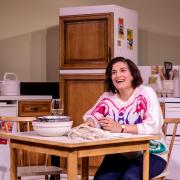The award-winning actress has never lost her sparkle, as Martin Pilkington discovers
%image(15803940, type="article-full", alt="The light projection called "185 Piccadilly" by Novak onto the BAFTA building featured famous British actors, such as Alison Steadman. Credit: Stephen Chung / Alamy Live News")
Depending on your age Alison Steadman may be Beverly in Abigail’s Party or Candice Marie in Nuts in May, Mrs Bennet in the definitive TV Pride and Prejudice, Betty in Fat Friends, or Pam Shipman in Gavin and Stacy. Or actually any one of hundreds of roles in a career that covers television, film, theatre and (perhaps her biggest love) radio. Not bad for a girl who (initially) failed to get a place in the local youth theatre project when she was at school.
‘When I was 14 my grammar school headmistress announced there was to be a free drama course at the Liverpool Youth Theatre every Friday. I didn’t get a place and was really fed up about it, but they said those not on the weekly course could definitely get a place on the Easter holiday one, so I and a school friend went to that. I loved it, was absolutely in my element,’ she says. ‘There was a buzz about Liverpool in the early 60s when I was a teenager, we went to the Cavern, we were very proud of being the city that produced the Beatles and Gerry and the Pacemakers and the rest, but it was youth theatre that kicked off my personal development.’
Having seen the city sink from that 60s golden age to the hard times of the 1980s she’s delighted at its resurgence. ‘I love the dock, I love Liverpool ONE, all the regeneration that’s gone on. There are still deprived and depressed areas but the city is fun and lively again, the European Capital of Culture thing gave it a real boost.
‘Liverpool still feels like my home town though I haven’t lived here for many years. I’ve got a close connection with it and come back frequently.’ Her homecoming this time is, fittingly, to support a new generation of young filmmakers, presenting prizes at the annual awards ceremony of local charity Clapperboard. It’s a cause she’s been involved with for a while, something recognised by one of the gongs – for active citizenship – being named in her honour.
‘I was so impressed with and touched by the quality of the films made by these very young people. Obviously I’ve been involved in film most of my life, and my son is a film maker, so I know the struggle there is to get backing and once done to get them screened. It’s an incredibly hard business,’ she says.
It’s giving something back to a city that has been good to her. When in her late teens she expressed an interest in training as an actress Jim Wiggins, a teacher involved in running the youth group who later became a successful actor himself, took her to the Liverpool Playhouse to seek advice on drama schools from actors and directors. Her love of improvisation and gift for mimicry saw Alison nudged towards the radical East 15 Acting School, though her otherwise very supportive parents insisted she developed a back-up plan first. ‘They said: “You’re not going off to London at 17. Get yourself a job first, it’s a very precarious profession. If you learn shorthand and typing you’ll have something to help when there’s no work, and you can earn a few bob in the holidays,”’ she recalls.
She worked at Walton probation office for a couple of years before heading off to school in London. ‘I had to have all these books – the complete works of Shakespeare, Stanislavski’s An Actor Prepares and so on, and I didn’t have any money, so the office clubbed together and bought them all for me and gave me a little leaving party.’
For a girl who’d never really been anywhere but Liverpool, the Isle of Man and North Wales, life in the capital was very different. Going to professional theatre was not something her family did, and now she was able to see innumerable shows including, most memorably, the first production of Tom Stoppard’s Rosencrantz and Guildenstern Are Dead. But her initial impression was of something more personal. ‘The first thing that struck me was the way everyone swore all the time there. My parents never swore, and in Liverpool you just didn’t hear people swearing like that.’
Alison returned to her home city in 1971 to work for a year at the ground-breaking Everyman Theatre. ‘There were a few interesting moments at the Everyman – I was in one play where the boys in it had to parade around naked on stage, and I remember my parents coming to see it – can you imagine something like that then? It’s still a bit shocking now.’
Those parental worries about Alison being out of work as an actress proved unfounded. Her acting CV is long and incredibly varied, partly because of a conscious decision early on not to play on her roots. ‘I always wanted to do as many different things as possible, and have been really lucky to be offered different things – the one thing I never wanted was to be bracketed as “Alison Steadman, Liverpool Actress,” and getting stuck in that one rut. I wanted fun, and variety, and not to be in a soap playing a Liverpool girl forever.’
At 70 the phone still rings and scripts still come through the letterbox. She finished a radio comedy before travelling to Liverpool, has another upcoming, and is about to start on a much anticipated sitcom with John Cleese. Somehow she still finds time for her other passion, wildlife.
‘If I hadn’t been an actress I would have wanted to work in wildlife conservation or something similar. I’m very keen on preserving wild spaces wherever they are, including cities,’ hence her role as an ambassador for the London Wildlife Trust. As if that’s not enough, she’s about to publish a children’s book, Spider, with illustrations by Mark Chambers. So maybe those typing skills came in handy after all.



























